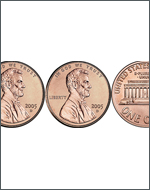

|
Galton's Paradox
Sunday, January 4, 2009 | Math
Suppose you flip three fair coins, what is the probability all three match?
h = heads
t = tails
t = .5 (50% chance of getting tails)
ttt = .5*.5*.5
hhh = .5*.5*.5
ttt or hhh =.5^3 +.5^3 = .25
It seems from the math that the percentage that all 3 will match is 25%...
However...
Necessarily two will match, and it's an even chance whether the third will be heads or tails.
Therefore the chance that all three will match is 1/2, .5, or 50%.
Click here to view the a copy of the letter to Nature in which Galton describes his paradox (that he humbly ascribes to someone he heard from). It's kind of entertaining that he actually draws out a table that is quite informative in illustrating the fallacy, but then verbally describes each group, then tests the prediction with dice! I imagine that if he found that the odds truly were 1/2 with the dice, he would have jumped out of his window, because clearly the laws of the real world had no connection to logic.
Sir Francis Galton FRS (16 February 1822 – 17 January 1911), half-cousin of Charles Darwin, was an English Victorian polymath, anthropologist, eugenicist, tropical explorer, geographer, inventor, meteorologist, proto-geneticist, psychometrician, and statistician. He was knighted in 1909.
Galton had a prolific intellect, and produced over 340 papers and books throughout his lifetime. He also created the statistical concept of correlation and widely promoted regression toward the mean. He was the first to apply statistical methods to the study of human differences and inheritance of intelligence, and introduced the use of questionnaires and surveys for collecting data on human communities, which he needed for genealogical and biographical works and for his anthropometric studies. He was a pioneer in eugenics, coining the very term itself and the phrase "nature versus nurture". As an investigator of the human mind, he founded psychometrics (the science of measuring mental faculties) and differential psychology. He devised a method for classifying fingerprints that proved useful in forensic science. As the initiator of scientific meteorology, he devised the first weather map, proposed a theory of anticyclones, and was the first to establish a complete record of short-term climatic phenomena on a European scale. He also invented the Galton Whistle for testing differential hearing ability.

|


|

